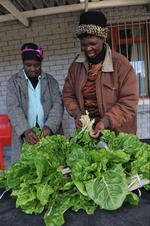Eating for Health

Growing vegetables, fruit, nuts and so forth within the city is a great way to make sure that food that was ‘recently alive’ is on hand.
Now we need to tackle the tricky issue of localising protein production too, in a way that is ethically responsible to animals and doesn’t import the pollution problems associated with farming livestock into the city.
Aquaculture, eggs and meat from free range chickens, and dairy from small livestock might be a way, if city bylaws can accommodate this.
Poor nutrition, and the burden of the lifestyle-related diseases associated with a diet that’s high in calories but low in micronutrients, also undermines the treatment of other serious illnesses, such as HIV and TB.
Consider the amount of money already spent by the healthcare system in terms of trying to prevent or treat these diseases, and then add that these efforts are undermined by poor nutrition.
That means that a lack of access to wholesome foods has a broader cost, which we often don’t factor in.
Polluters of the Nutritional Landscape

At the moment, parts of the private food sector benefit from our dependence on (and sometimes our addiction to) certain highly refined but nutrient-poor foods. Yet in many cases it is the state that has to pick up the healthcare costs in terms of treating obesity, diabetes, heart disease and cancers associated with eating this diet.
In environmental law, there’s the principle of ‘the polluter pays’. If a mining company pollutes a wetland, in theory the company is responsible for covering the cost of the cleanup.
It may be useful to see certain elements of the food industry as polluters of the nutritional landscape and then find ways to make them contribute to cleaning up the problem.
A sin tax, similar to that applied to alcohol or tobacco, isn’t the answer, because people often still find ways to afford their favourite ‘fix’. But some market mechanisms need to be found.